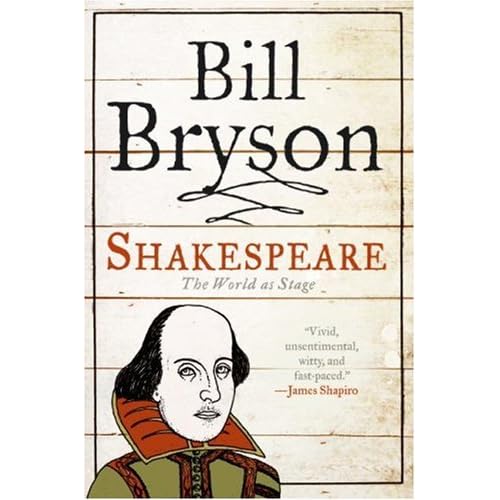Review: Double-billed
 Shakespeare: The World as Stage, by Bill Bryson
Shakespeare: The World as Stage, by Bill Bryson
Not enough Bill Bryson and not enough Bill Shakespeare. The World as Stage is the latest in the Eminent Lives series of brief bios. Nobody may need yet another book on Shakespeare, Mr. Bryson admits, but "this series does."
So here he is: Mr. Bryson constrains himself to relating the few known facts in a conventional chronological narrative, repeatedly emphasizing just how little we do know for certain (all three supposed portraits of Shakespeare are relatively dicey in their provenance, for example). He digresses into interesting byways (Christopher Marlowe) and period color (the plague) as well as the occasional foray into journalism (a visit to the National Archives). One wishes for more of the latter, much more: Mr. Bryson's characteristic humor and wry observations would have bumped up the proceedings enjoyably. After all, he gets top billing over the Bard; he should have let himself expand things.
Given all the wish-fulfillment fiction about the Bard, sticking to just the facts, ma'am, is certainly admirable. But equally dismissing all suppositions and theories is both a flawed and cramped argument.
Shakespeare's dedications of his sonnets to the Earl of Southhampton, for instance, have naturally been "picked over" by scholars, as Mr. Bryson notes. But, he concludes, in the end "we know nothing at all about the relationship, if any, that existed between Shakespeare and Southhampton."
Mr. Bryson prints both dedications, however, and readers can see for themselves what many scholars have concluded: The two dedications are fundamentally different, indicating a shift in, if nothing else, Shakespeare's confidence and affection toward the Earl.
What's more, what Mr. Bryson doesn't mention, the second dedication is like no other Elizabethan dedication in existence: glowing, personal, even intimate sounding ("What I have done is yours; what I have to do is yours"). Which means that no other firm evidence may exist for a relationship, but that lack doesn't invalidate this warm piece of evidence. Something happened between the two publications.
In the same sceptical spirit, perhaps, Mr. Bryson foregoes almost anything to be said about the plays or poems themselves -- except loads of statistics. On average, for instance, the plays are about 70 percent blank verse, 5 percent rhymed and 25 percent prose -- from such data Mr. Bryson draws few conclusions of any great interest or depth. Too bad. The World as Stage is still halfway entertaining and a decent enough intro. But outside of formulaic statements about Shakespeare's genius, it gives us little reason why we'd read about him at all.
Categories:
Blogroll
Critical Mass (National Book Critics Circle blog)
Acephalous
Again With the Comics
Bookbitch
Bookdwarf
Bookforum
BookFox
Booklust
Bookninja
Books, Inq.
Bookslut
Booktrade
Book World
Brit Lit Blogs
Buzz, Balls & Hype
Conversational Reading
Critical Compendium
Crooked Timber
The Elegant Variation
Flyover
GalleyCat
Grumpy Old Bookman
Hermenautic Circle
The High Hat
Intellectual Affairs
Jon Swift
Laila Lalami
Lenin's Tomb
Light Reading
The Litblog Co-op
The Literary Saloon
LitMinds
MetaxuCafe
The Millions
Old Hag
The Phil Nugent Experience
Pinakothek
Powell's
Publishing Insider
The Quarterly Conversation
Quick Study (Scott McLemee)
Reading
Experience
Sentences
The Valve
Thrillers:
Confessions of an Idiosyncratic Mind
Crime Fiction Dossier
Detectives Beyond Borders
Mystery Ink
The Rap Sheet
Print Media:
Boston Globe Books
Chicago Tribune Books
The Chronicle Review
The Dallas Morning News
The Literary Review/UK
London Review of Books
Times Literary Supplement
San Francisco Chronicle Books
Voice Literary Supplement
Washington Post Book World
